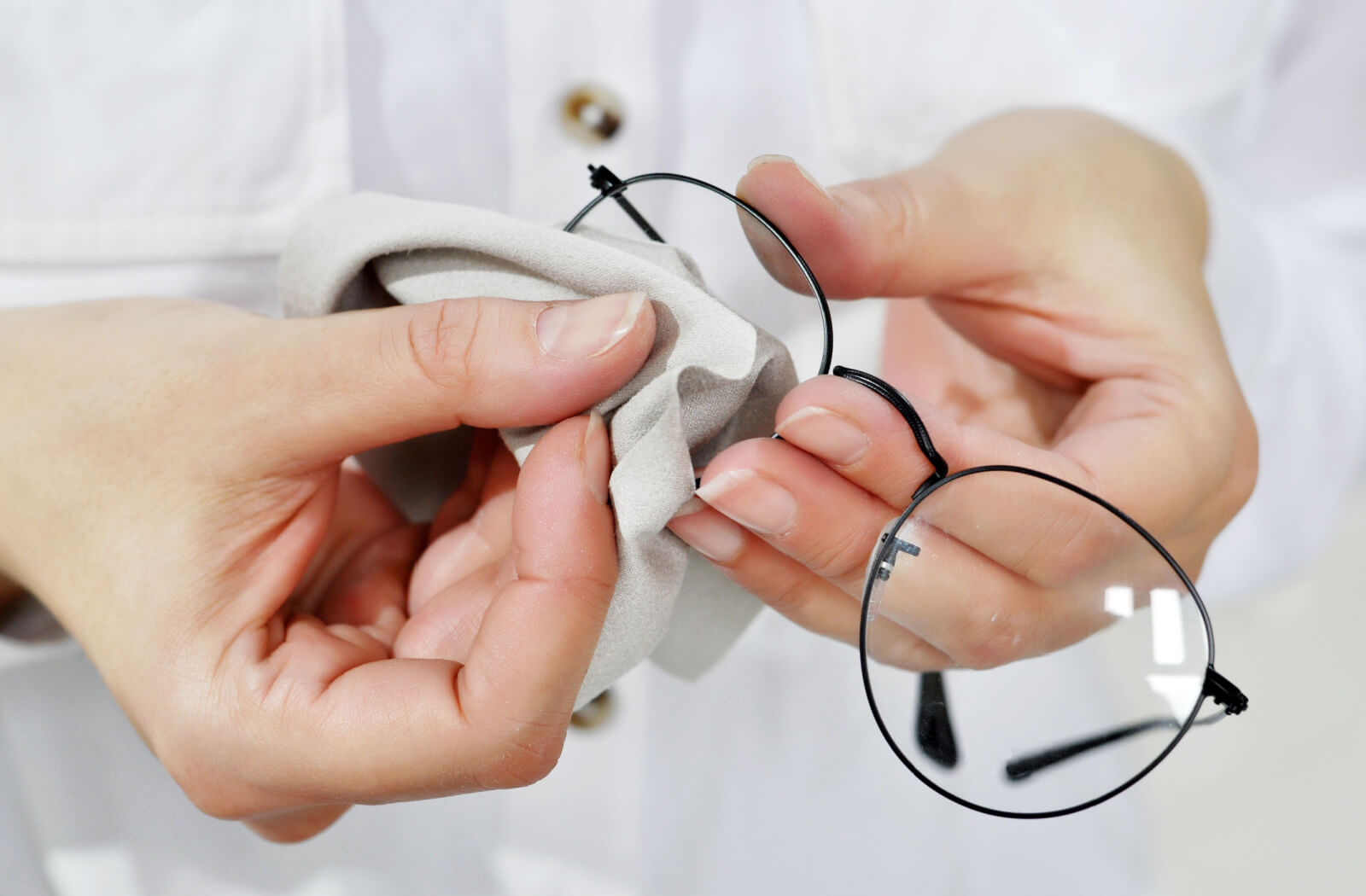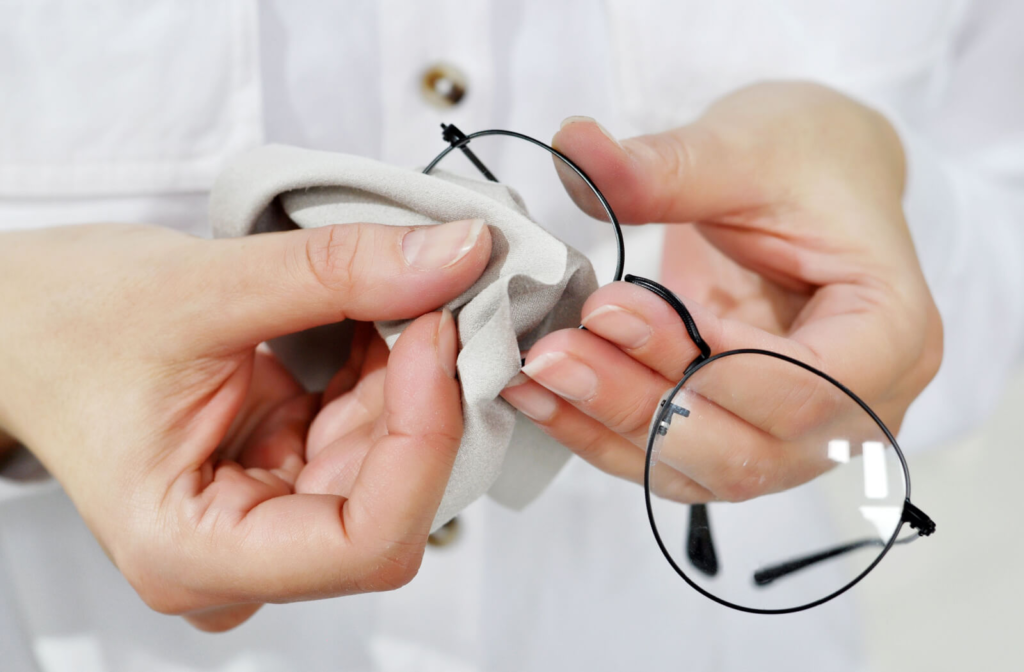Getting new, clean eyeglasses after an eye exam can be exciting—until they get dirty. Having dirt, dust, and fingerprints on your lenses can be distracting. Thankfully, you can always clean them!
If your lenses have an anti-reflective coating, you must handle your eyeglasses carefully. You should gently clean your coated lenses with a microfiber cloth, water, and a gentle cleanser or dish soap to avoid damage to the lens.
Some cleaning methods should be avoided to protect your lenses from scratches in the coating. As your eye care team, we’re here to offer advice and directions on caring for your new pair of glasses to keep them looking sharp and pristine.
What Is an Anti-Reflective Coating?
Unlike the name suggests, an anti-reflective coating isn’t actually painted on the lens. Instead, it’s fused to the lens itself in layers to reduce reflection and let more light pass through.
The primary benefits of anti-reflective lenses include:
- Durability: the lenses are firm, and the coating is designed to be durable as well.
- Vision support: anti-reflective coatings can help more light pass through your lenses for improved visual support.
- Reduced glare: anti-reflective coatings can help reduce glare from screens and can also help reduce glare while driving at night.
What Are Anti-Reflective Eyeglasses Good For?
In situations with elevated levels of glare, an anti-reflective coating can reduce eye strain, headaches, and eye irritation. Working on screens can lead to computer vision syndrome—also known as digital eye strain. Anti-reflective lens coatings can help some people manage symptoms caused by digital eye strain.
Glare can also be common while driving at night, particularly among people affected by astigmatism, which can cause halos around streetlights. An anti-reflective coating can reduce the appearance of glares at night to help keep you safe and reduce eye strain.

How to Clean Your Glasses
Maintaining the look and effectiveness of your anti-reflective coated lenses requires gentle cleaning so they last. Cleaning your glasses is simple. You only need a microfibre cloth, water, and lotion-free dishwashing soap.
To clean your glasses, follow these steps:
- Wash your hands to avoid transferring grime to your glasses.
- Rinse your glasses under lukewarm water, but not hot water. (If it’s too hot, it can damage the anti-reflective coating.)
- Use a drop of dish soap to rub away dirt, oils, and particles.
- Rinse the glasses and dry them with a microfibre cloth.
Always rinse your glasses with water at the outset, or use pre-moistened wipes if your optician recommends them. The moisture from water can help prevent damage caused by wiping debris away. If there’s debris caught in the nose pads or hinges of the arms, use a cotton swab to access those smaller areas.
When dirt shows up, it can be highly visible. Frequent, light cleaning can prevent dirt and grime from accumulating before they become visible.
If you’re not wearing your glasses, storing them in your eyeglass case is the best way to keep them clean.
Why Proper Lens Care Matters
Your eyeglasses are an investment in your vision, comfort, and daily productivity. When lenses become scratched, smudged, or coated with residue, they can’t perform the way they’re designed to. Even small scratches can scatter light, reducing visual clarity and causing additional eye strain.
Proper lens care not only keeps your glasses looking great but also helps maintain their optical precision. For lenses with advanced coatings—such as anti-reflective, blue-light filtering, or UV protection—care routines are even more important. These coatings enhance your day-to-day vision, but they are delicate and can’t be repaired if damaged. By following recommended cleaning habits, you help safeguard both the coating and the long-term quality of your lenses.
How Not to Clean Your Glasses
A lot of products can cause damage to the lens coating on your eyeglasses that you may otherwise think are harmless, such as:
- Glass cleaner
- Vinegar
- Products with ammonia, bleach, or acetone
- Exhaling on your lenses
- Paper towels
- Facial tissues
- Clothes
When you notice your glasses are dirty, it’s tempting to reach for the closest solution, whether that’s the sleeve of your sweater or the hem of your shirt. However, these materials are heavily abrasive and can create scratches on the lenses.
Because of the nature of the coating, anti-reflective coatings on lenses can’t be repaired if damaged, so damaged lenses with coatings must be replaced to get the full benefit of the coating again.
Tips for Preventing Lens Damage
In addition to cleaning your glasses correctly, small daily habits can make a big difference in keeping your lenses clear and scratch-free. Consider incorporating the following preventive tips into your routine:
- Always use a case: Hard-shell eyeglass cases offer the best protection against dust, debris, and accidental bending or breakage.
- Avoid placing glasses lens-side down: Even smooth surfaces can hold tiny particles that scratch coatings.
- Keep glasses away from extreme temperatures: Hot dashboards in cars, steam from kitchens or saunas, and even hair dryers can weaken or warp lens coatings.
- Use a dedicated microfiber cloth: Instead of clothing or napkins, keep a clean microfiber cloth in your bag or case for on-the-go smudge removal.
- Schedule regular adjustments: Visiting your optician for minor frame adjustments can help prevent loose, misaligned parts that may trap dirt or cause uneven wear.
By protecting your glasses throughout the day, you can reduce how often you need to clean them and increase their overall lifespan.
Key Takeaways
- Anti-reflective coatings enhance clarity, reduce glare, and improve visual comfort—especially when using screens or driving at night.
- Always clean anti-reflective lenses gently using water, lotion-free dish soap, and a microfiber cloth.
- Avoid harsh chemicals, household cleaners, clothing, or dry wiping, as these can scratch or damage coatings.
- Frequent light cleaning prevents buildup and helps your glasses look and perform their best.
- Store glasses in a protective case and avoid high heat to preserve the integrity of the coating.
- When in doubt, ask your optician for care recommendations tailored to your specific lenses.
Consult a Professional with Concerns About Cleaning Your Glasses
Taking proper care of your glasses can help them last longer without degrading their quality. If your lenses have a special coating to make your life easier, ask our optometry team how to best care for them.
Schedule a comprehensive eye exam at The Eye Avenue to get an updated prescription and meet the opticians who can help you get your ideal pair of glasses.




